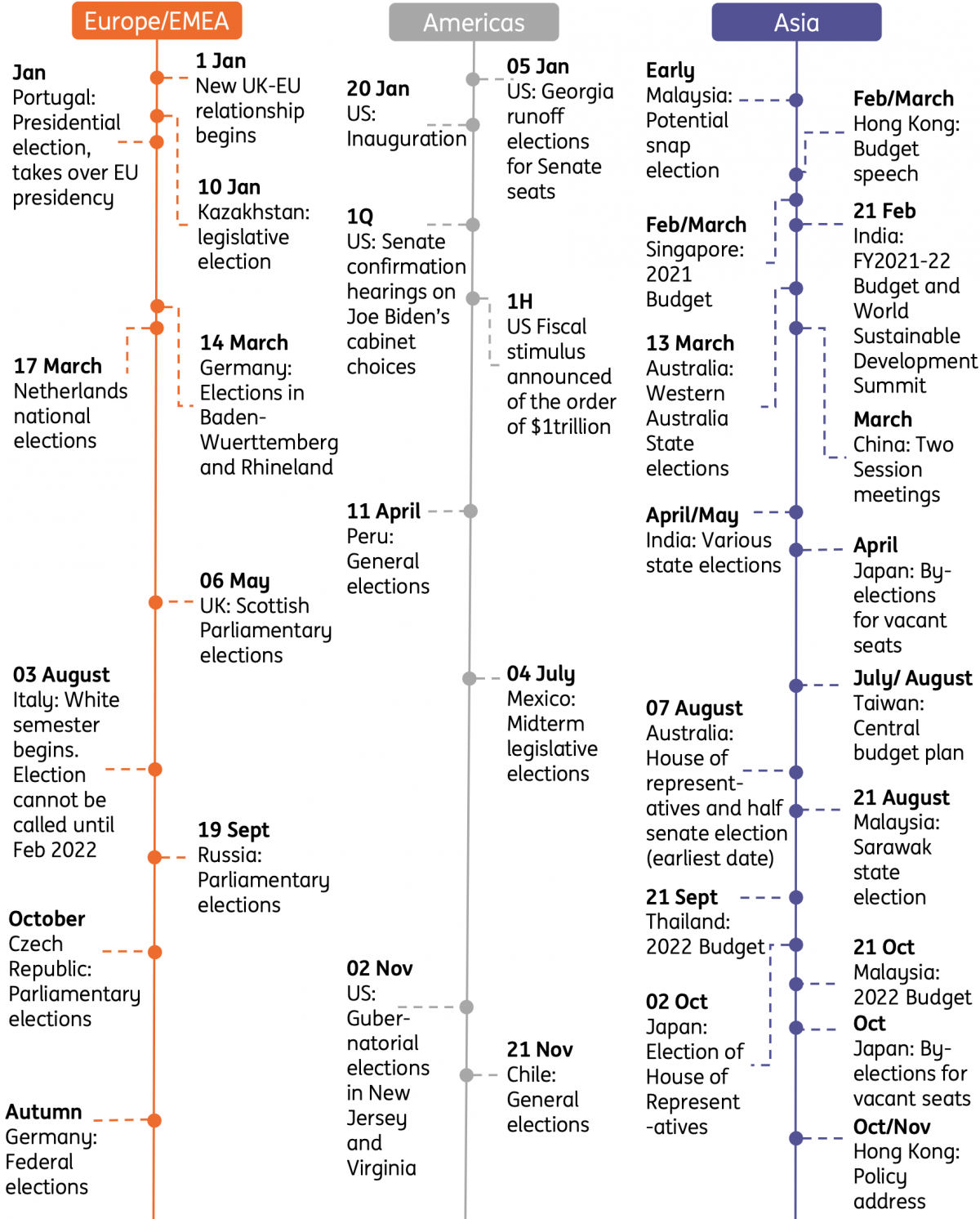Key political events in 2021
In the next twelve months, from Peru to India, the Netherlands to Australia, many elections and political events have the potential to shape the economic outlook
The key events we'll be watching in 2021

United States: The early-2021 race for the Senate
The US political calendar in 2021 will kick off with the run-off elections for Georgia’s two Senate seats.
No candidate got the required 50% of the popular vote in the presidential elections so it will be a straight race between the Democrat and Republican candidates in the absence of any other contenders. This will be critical for how aggressive Joe Biden can go with his legislative agenda. Should the Democrats win both seats, this will leave a 50-50 tie in the Senate, with Vice President Kamala Harris given the deciding vote on any piece of legislation that is split down party lines. This would facilitate a more ambitious policy change on tax, regulation and spending as there would be less need for watering down a piece of legislation to get Republicans onside. Nonetheless, filibuster rules, which require 60 votes to close a debate and move to a vote, will remain difficult to overcome.
The US political calendar in 2021 will kick off with the run-off elections for Georgia’s two Senate seats
On balance, it will be tough for the Democrats to win both, but tens of millions of dollars will be spent to try and convince the electorate in Georgia given the critical role these two votes play. We suspect that negotiations over a new fiscal stimulus will remain tricky and it will end up coming in closer to $1 trillion rather than $3 trillion in size. Nonetheless, with the very real prospect of a vaccine that can lift sentiment and lead to a broader reopening of the economy, this should still provide a strong platform for growth in 2021/22.
Europe: Rumbling core
It is often said that political and sometimes even existential tensions for the eurozone come from the periphery. In this regard, 2021 could be a good year for the monetary union as no elections are scheduled in southern European countries, though one can never entirely rule out Italian elections. On a more serious note, however, next year's political calendar will put the theory to test that it is not the periphery but rather the core countries in which anti-European parties could eventually bring the eurozone closer to the brink.
Both the Dutch and German elections have the potential to become historic events
It is hard to see that differing views on Europe will decide the elections in either Germany or the Netherlands. Instead, the management of the pandemic will probably be high on the agenda alongside other important topics. Nevertheless, watch out for right-wing populist parties in both countries. The more votes they garner, the more problematic it will be to form new governments.
In any case, both the Dutch and German elections could become historic events. Another term in office for Dutch Prime Minister Mark Rutte could make him the longest-serving government leader in Europe, at least if Angela Merkel indeed decides not to run in the autumn elections. The end of Merkel’s term in office could create a (short-lived) vacuum in European politics as currently none of her potential successors looks set – at least not immediately – to fill her shoes.
UK: Brexit noise to give way to Scottish uncertainty
Those hoping that Brexit will disappear off the news agenda forever from 2021 may be a little disappointed. Even if a deal is agreed, it will inevitably be a basic one. A free-trade agreement will avoid tariffs, but may not prove to be a particularly sustainable trading platform in the long-term. That's even more true if both sides begin trading on World Trade Organization terms from January - a deal will still inevitably be needed further down the line.
The rollercoaster ride of Brexit is likely to give way to more focus on the push for Scottish independence
That said, the rollercoaster ride of Brexit is likely to give way to more focus on the push for Scottish independence. The prospects of a relatively arms-length deal with the EU (Scotland did not vote for Brexit overall), combined with the unfavourable public perception of the handling of Covid-19 by the UK government, has seen support for independence climb through 2020.
Of course, the government in London needs to give its approval for another referendum akin to the one in 2014, something the current Conservative administration is very reluctant to do. But the pressure will inevitably grow through 2021, particularly in light of Scottish parliamentary elections in May that are predicted to heavily favour the Scottish National Party. Another referendum is probably a few years off, but there is nevertheless a creeping sense that a second vote may be more a question of 'when' rather than 'if'.
Asia: Japanese, Indian and (possibly) Malaysian elections the focus
On paper, 2021 promises to be a relatively quiet period for Asia, with possible snap elections resulting from the perennially weak government in Malaysia the likely highlight on the calendar.
Japanese elections for the House of Representatives are unlikely to be very eventful, rubber-stamping Prime Minister Yoshihide Suga’s hold on power. Otherwise, a string of local and regional elections fill the political calendar. Some of these, for example, state elections in India, may provide an indication of potential future upsets in general elections.
More likely, it will be unscheduled events that attract the most attention, with growing unrest in Thailand likely to generate some political backlash as protesters push for government change and reform of the monarchy.
Latam: Peru, Chile and Mexico to stage key elections
Latin America’s political calendar will be dominated by general elections in Peru and Chile, along with mid-term elections in Mexico.
Peru and Chile have already been facing tremendous political tumult for the last few years and, even though elections typically generate uncertainty, there’s some hope that, in these two cases, elections could pave the way for less political friction.
Latin America’s political calendar will be dominated by general elections in Peru and Chile, along with mid-term elections in Mexico
In Peru, the April election of a president with a working legislative majority appears essential to end years of political dysfunction that has resulted in a very unstable presidential mandate, including three presidents in less than the five-year typical mandate. In Chile, social unrest provides fertile ground for political instability that could also calm down following the election of a constitutional convention to rewrite the country’s constitution, taking place in April, and general elections in November.
Overall, while uncertainty is likely to remain elevated, the political calendar could also serve to reset political expectations and create a more harmonious political environment in the Andes. In Mexico, the focus will be on mid-term elections in July, with Congressional races helping determine President Lopez Obrador’s ability to hold on to the large majority he currently enjoys. AMLO remains popular, but the deep recession and Mexico’s questionable handling of the pandemic may reduce MORENA’s ability to keep its current share of seats in the Lower House.
This publication has been prepared by ING solely for information purposes irrespective of a particular user's means, financial situation or investment objectives. The information does not constitute investment recommendation, and nor is it investment, legal or tax advice or an offer or solicitation to purchase or sell any financial instrument. Read more
Download
Download article
17 November 2020
Global Macro Outlook 2021: The darkness before the dawn This bundle contains 15 Articles


